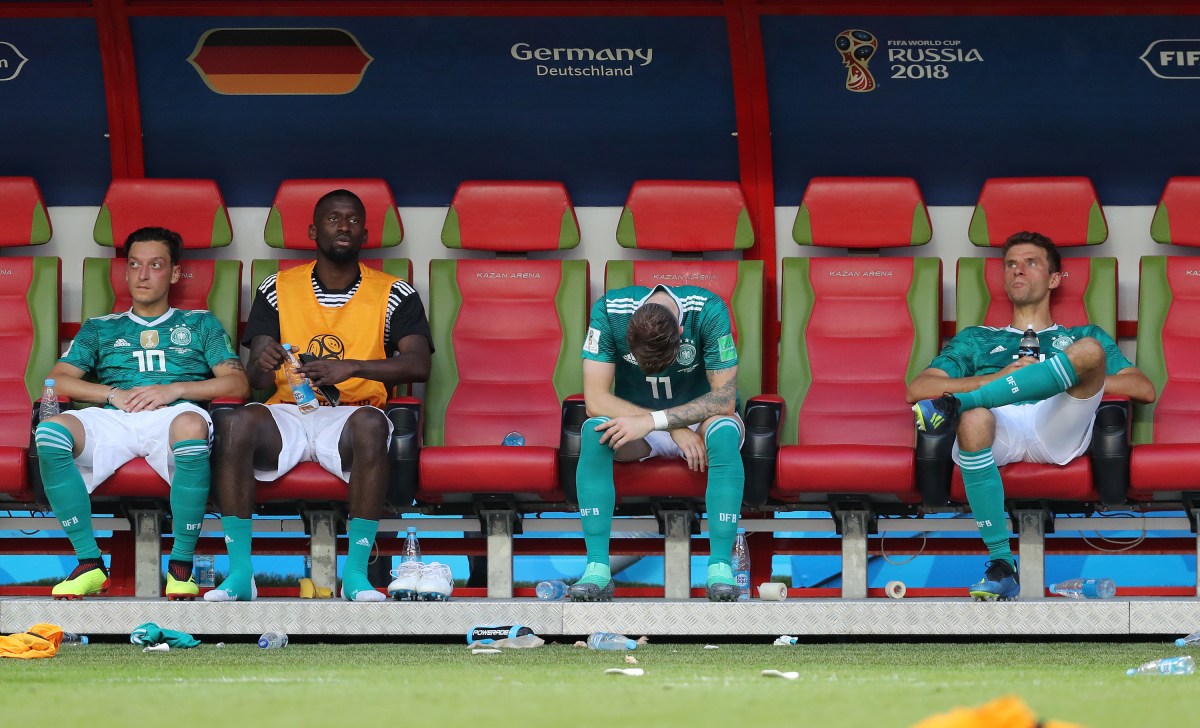Germany had one of the most impressive World Cups ever in 2014: 6-0-1, four goals allowed, 18 scored. Deutschland’s dominance was particularly evident against places that speak Portuguese: a 4-0 demolition of Portugal/Cristiano Ronaldo and the notorious 7-1 shellacking of Cup host Brazil.
Die Mannschaft again gave up four goals at the 2018 World Cup. Unfortunately, they yielded them in just three games while scoring only twice themselves, which is why they failed to advance to the Round of 16 in their worst Fußball performance since 1938. (Their previous four Cups had gone runner-up, third place, third place, champ.)
They aren’t alone. 2010 World Cup champion Spain failed to get out of the Group Stage in 2014—this year they lost in the Round of 16 to Russia in a massive upset.
And 2006 World Cup champion Italy failed to escape the Group Stage in both 2010 and 2014 before moving in the wrong direction this year by missing the World Cup altogether.
This is particularly strange because the Cup is passed around a very select group of countries. How select?
-Brazil, Germany, and Italy have combined for 13 World Cup titles.
-After this Cup, the other 208 FIFA member nations will have won a total of eight.
Yet when the 21st installment of the World Cup ends on July 15, we won’t have seen a repeat since Brazil defended their title in 1962, a mere 14 Cups ago.
With the help of Made Man Editor-in-Chief and soccer obsessive Steve Mazzucchi (who has sought to create a brighter future for the sport in America with articles like “How It Might Look If Our Best Athletes Played Soccer”—if Kevin Durant gets bored winning titles with the Warriors, he should put that 7’5″ wingspan to work as a goalie), this is why World Cup glory turns grim.
Time Is Cruel (Philosophically). “Four years is a long time,” Mazzucchi says simply. The game keeps moving. Spain’s possession-heavy “tiki-taka” style of play was hailed as revolutionary when they won the nation’s first World Cup in 2010. In the wake of going bust in 2018, it’s now mocked as “pointless” by their own former stars like Cesc Fabregas.
Let’s say a manager is willing and able to stay abreast of all the changes in the beautiful game. It still might not matter because…
Time Is Cruel (Physically). Mazzucchi observes every manager coming off a successful Cup must choose between sticking with players now “a bit long in the tooth” or bringing in the kids who “may not have the chops to reach the same heights.” It’s a tough decision. Sometimes impossible. Because it forces you to ask…
When Do You Give Up on Guys Who Gave Everything? Elite soccer players play an ever-increasing number of games for the clubs, including exhibitions, league matches, and various Cup competitions. Then they have to play friendlies and qualifiers for their nation before at last taking on those seven matches necessary to win a World Cup.
Earning a title can do lasting damage to a player. In the 2014 World Cup Final, Bastian Schweinsteiger managed to hold the German defense together against Argentina as other teammates went down with injuries. He ignored his own damaged knee during a brutal game that saw opponents knock him to the ground at least six times.
In extra time, Germany finally came out on top. Schweinsteiger returned home a hero—he was still yet to turn 30 and already a star for the nation’s biggest and most successful club, Bayern Munich. (He joined them when he was only 13.)
Schweinsteiger never regained his form. He was dumped by Bayern in 2015 and effectively abandoned by Europe itself when new squad Manchester United lost interest after a miserable stay, forcing him to accept the final destination of many an aging icon who’s run out of options: America. (In his case, the Chicago Fire.)
Schweini had deteriorated so much that it was a no-brainer to leave him out in 2018. (He last competed for the national team in 2016.) But what about a player in slightly better shape? How about one of the guys who smashed him to the ground in 2014?
Argentine Javier Mascherano—who Schweinsteiger praised as “the leader of the pack of wolves”—didn’t win a World Cup in 2014. He doesn’t need to apologize though, because Argentina wouldn’t have reached the Final without him. His highlights included a game-saving tackle in the semis, which became even more impressive when he later revealed that the play “tore my anus.” (And yes, this is the ultimate example of a player putting his ass on the line to win.)
Mascherano recovered better than Schweinsteiger did, continuing to play both for Argentina and Barcelona F.C. He went to the World Cup in 2018. Well, most of him did—arguably his legs failed to make the trip. While the toughness remained, the speed was gone. Following their elimination, 34-year-old Mascherano retired from the national team. (On the club level, he had already left Barca and La Liga earlier in 2018 to play in China.)
Of course, it’s possible without Mascherano that Argentina would have been even worse. (When the guy who played through a torn anus screams at you, you listen.) The next generation may simply not have as much to offer. And even if they do…
Too Much Talent Is Its Own Trap. Germany crashing out of the World Cup was particularly jarring because they had continued to fill the trophy case. They won a silver medal at the 2016 Olympics. 2017 was even better, with titles at both the Confederations Cup and the UEFA European Under-21 Football Championship. And they accomplished these feats not with the Cup heroes but up-and-comers. When the 2018 World Cup rolled around, they largely went back to the veterans.
In theory, this was ingenious: They had provided a new generation of players experience while sparing their vets from wear-and-tear.
In reality, this proved to be stupid. A team can only bring 23 players to the World Cup, no matter how many dozens of tantalizing prospects you have back home. By turning down a chance to give the holdovers a tournament test-run in 2017, Germany wound up with a group that had once been a machine—or, as the Germans put it, eine Maschine—yet in 2018 never really clicked. The players looked like they hadn’t spent much time as a team, probably because they hadn’t.
(Mazzucchi notes that in general there’s a struggle with the “limited amount of time that national teams actually play together.”)
At this point, let’s stop looking at why teams can’t repeat and learn a lesson from one that did.
Repeating Requires Multiple Stars. Pelé scored six goals at the 1958 World Cup, yet arguably wasn’t even Brazil’s top player. (Teammate Didi was given the Golden Ball as the Cup’s crème de la crème.)
Then in 1962, Pelé went down with an injury in Brazil’s second game, missing the rest of the Cup. Luckily, Brazil boasted a third icon from that 1958 team: Garrincha. He stepped up and took Brazil to the title, collecting the Cup’s Golden Ball and Golden Boot (most goals) along the way.
Since 1962, Brazil has come the closest to a repeat of any nation. They won titles in 1994 and 2002, with an appearance in the Final in 1998. During this run, they featured four players named FIFA World Player of the Year at least once (and thoughtfully, they all started their names with “R”): Romário, Ronaldo (Brazilian version), Rivaldo and Ronaldinho.
Both Ronaldinho and Ronaldo were multiple winners. Indeed, by 26 each had repeated as Player of the Year and won a World Cup. (Incredibly, by this age Ronaldo had already won two Cups and played in that third Final while collecting three Player of the Year trophies.) Many nations have never produced a single player at this level—to have multiple talents of this magnitude in the same generation is simply unimaginable for most of the planet.
Of course, after that age, neither won another Player of the Year Award or World Cup. Why?
Winning a Cup Can Make a Man Crazy. Believe it or not, being worshipped in your home country and celebrated across the rest of the globe can throw off a fellow’s equilibrium. Garrincha failed to win a third Cup in large part because of his habit of drinking a bottle of cachaca each day. This likely contributed to troubling behaviors including driving over his own father—he died at just 49, leaving behind 14 children by five women. Even in death, Garrincha can’t stay clear of chaos, with family members claiming in 2017 that his body had been exhumed and somehow lost.
So it is with other legends. Ronaldinho gradually became less known for his play than his partying. Ronaldo was notorious for his hatred of training or apparently exercise in general, leading to the cruel but fairly accurate nickname “Fat Ronaldo.” And perhaps Diego Maradona would have come closer to duplicating his extraordinary performance in 1986 if he had consumed a touch less cocaine.
Of course, there’s a Cup factor that’s beyond the control of players: location.
You Don’t Get to Host Consecutive World Cups. If you want to win a World Cup, have it in your backyard. These are champs who took full advantage of the home field:
-Uruguay in 1930
-Italy in 1934
-England in 1966 (to date, their only title)
-(Then West) Germany in 1974
-Argentina in 1978
-France in 1998 (their only title to date, though they hope that soon changes)
This edge goes beyond home cooking. There is speculation that Italy in 1934 (then under the control of Benito Mussolini) and Argentina in 1978 (then under the rule of a military dictatorship) actively rigged matches. Host Russia’s unexpectedly strong showing in 2018 has inspired similar questions—did a nation with a history of state-sponsored doping put it into practice again? (Indeed, star Denis Cheryshev’s own father has implied as much.)
In general, the farther away the Cup is, the less likely a team is to win. Only once has a South American squad won on European soil (Brazil in 1958—they beat host Sweden in the Final) or Europeans triumphed in the Americas (Germany in Brazil in 2014).
The only nation that consistently travels well is Brazil, winning a title in Europe (Sweden in 1958), South America (Chile in 1962), Asia (Japan in 2002) and North America twice (Mexico in 1970 and the United States in 1994). But even Brazil has one destination they need to avoid at all costs: Brazil. (They suffered scarring defeats when they hosted in 1950 and 2014.)
Yet a team could have everything come together and still fall short because of…
The Whims of One-and-Done. Generally, tournaments like the Champions League feature two-legged ties until the Final, so a team that had an off night gets a shot at putting everything right in game two.
The World Cup requires a team to win four elimination games. So if:
-A ball takes a funny bounce and goes in the goal.
-A ball takes a funny bounce and doesn’t.
-The referee gives out a red card.
-The referee should give a red card but declines.
-A handball is called.
-A handball is missed.
-Someone gets hurt seriously enough they leave the game.
-Someone gets hurt yet keeps playing—but performs so badly it turns out it would have been better if they’d just sat.
Or any of the hundreds of other random things that can shape a game’s outcome occur, repeating becomes a dream deferred.
Add it all up and it’s why Mazzucchi says the world has now waited over half a century for “lightning to strike twice in four years,” with no bolts in sight.
Whether you’re looking to get into shape, or just get out of a funk, The Charge has got you covered. Sign up for our new wellness newsletter today.
























